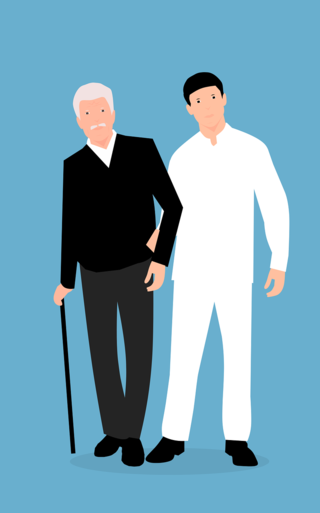Health
It Is as Healthy to Give as to Receive
Studies show that we need each other.
Posted November 13, 2021 Reviewed by Lybi Ma
Key points
- The support of friends and family can change an individual’s physiology, leading to slightly fewer health risks.
- Having support gives an individual resources and helps with health habits, resulting in better health outcomes for that individual.
- Giving support, rather than just being a recipient of support, can help health outcomes for the giver.
- We need reciprocity of support, if members of the population are going to remain healthy.

We have all experienced stress during the pandemic, and we know that many of our neighbors need assistance. For a while, American actor and filmmaker John Krasinski lifted spirits with his web series Some Good News, which told stories of people helping one another and spreading positivity during the pandemic. But can acts of kindness and generosity be as beneficial to the giver as they are to the receiver? Recent research indicates that one’s longevity may be enhanced by stepping up, being a good citizen, and reaching out to a needy neighbor.
Social science researchers report that social support (provision of emotional, informational, and instrumental resources) can either:
- Buffer stress, and as a result, improve the recipient’s health
And or
- Affect a recipient’s health behaviors (via peer pressure) and thus improve (or worsen) health.
Social support has been shown to decrease cardiovascular disease; improve survival before a diagnosis of heart disease; decrease inflammation, often a precursor to disease; and improve mortality. Humans are built for social connections, as having them ensures that we have both the positive emotions to decrease stress and the resources needed to get health information.
But, does it matter or help our health when and if we give support? The research is mixed, one can overdo and find that giving support can stress and tax us. This can worsen health, especially if one is a full-time caregiver. However, some reciprocity is beneficial. We get support back from the other person after it is given. The receiver gets a health boost, knowing they have a listening ear or resources such as transportation, but the giver of support also benefits; the biochemical endorphins kick in when one offers support and assistance.
Since human interaction is complex, some reciprocity is expected. Research indicates that older adults have more reciprocal relationships than do younger adults. One study showed that in a sample of 108 seniors, aged 60 to 90, that:
- Giving and receiving support in families is associated with life satisfaction
- Older givers of support express more life satisfaction than non-givers
Another longitudinal study looked at social support received and social support given, in a sample of elders. The study demonstrated that after the four-year study, the seniors who were offering support, who were in a reciprocal relationship, had less chance of death. Early on, humans may get their sense of reciprocity from family units. Family members model altruistic actions (as well as negative punitive reactions). Also, religious traditions emphasize giving and reciprocity, the Christian tradition asserts that “it is more blessed to give than toreceive.”
And, while the lesson from the Bible showcases in-person giving, similar lessons are true today despite new social trends. For example, persons interacting via new social approaches, or through social media, often act reciprocally. In an online forum for persons with depression, those who contributed the most also gained the most. Users “provide social support to others to garner support for themselves.”
Aside from the good feeling one gets from being altruistic while giving support, how does the giver receive health benefits? For one, being part of a group assumes that there will be mutual affirmation and sharing. But, also, giving (and receiving) support can influence the sympathetic nervous system, the hypothalamic-pituitary-adrenal system, and the immune system. One recent study showed that giving support resulted in lower blood pressure and less depression, and another study showed that in married couples, positive changes in the brain occurred when partners gave their partner support as measured by functional MRIs.
New neuroscience research shows the exciting revelation that brains are ever-changing after exposures and stimuli. Neuroplasticity gives humans hope that their dynamic brains are always adapting. While much of the research indicates that there are critical developmental periods or windows when brains are highly susceptible to sensory inputs, usually when persons are young, there is also some recognition that brain plasticity may be affected by later life inputs.
If this is the case, that the brain can change and adapt late into life, can the human brain be positively affected by giving support? Cognitive-behavioral therapy and some meditation can affect the brain. Specifically, meditation that focuses on compassion and kindness has been shown to decrease negative feelings. If giving changes blood pressure and physiology, might it also affect the brain, influencing a person’s optimistic temperament?
Researchers have noted that physical exercise might affect neuroplasticity with a resulting decrease in the chance for Alzheimer’s Disease. Perhaps compassion and kindness associated with giving can improve long-term health outcomes. The reverse is true in that negative stimuli can affect the brain. Stress can trigger reactions in the amygdala, which can cause an individual to have a panic-like response. The brain is mildly pliable and can be affected by positive and negative stimuli.
Therefore, generous givers may be more healthy than non-givers. Shouldn’t we all thus strive to be giving and helpful so as to assist others and to influence our own physiology and brain chemistry in a positive manner? Yes, to an extent, giving can help the giver as much as the receiver.
However, we all know of caregivers who have burnt out and are at risk for stress and health problems. Equilibrium is disrupted if a giver is doing 95 percent of the giving and not having a chance to receive any assistance. The trick is finding the middle ground: Helping others can stimulate positive hormones in the giver, but when the giver feels exhausted, over-burdened, and hopeless. This can occur when there is no reciprocity, they need to bring in others to relieve them. The idea that “it is more healthy to give than to receive” is true only if there is a good balance between giving and receiving.




